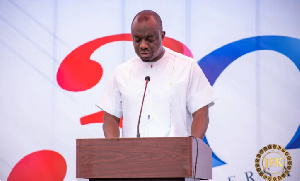Business News of Wednesday, 15 June 2022
Source: GNA
PPP game changer for cross-border infrastructure development for AfCFTA - Ebo Turkson
Professor Festus Ebo Turkson, a Development Economist, says Africa has the potential to build a strong infrastructure base through Public Private Partnerships (PPPs) to enhance cross-border trade on the continent.
Prof Turkson noted that there were deficits in both soft and hard infrastructure on the continent, which was a major bottleneck to the implementation of the African Continental Free Trade Area (AfCFTA).
The hard infrastructure includes ports, railways, roads, and airports, while the soft are: excessive checkpoints, burdensome administrative procedures, and inefficient processing at border crossings.
He said those challenges could be addressed by harnessing opportunities PPPs offered to the continent to facilitate cross-border trade, thereby, encouraging investments to increase economic integration and cooperation among Africans.
Prof Turkson spoke at the just ended Ghana Academy of Arts and Sciences (GAAS) and Universal Merchant Bank (UMB) public lecture in Accra, noting that the reliance on PPPs was a viable way for Africa to support large infrastructure investments and development.
Prof Turkson, who is the Coordinator, Economic Policy Management Programme, University of Ghana, said: “There are opportunities that the continent can leverage to increase intra-African trade, and this include PPPs.”
“PPPs distribute resources, risks, responsibilities and rewards between the public and private sectors, allowing Governments to overcome fiscal constraints and filling the gap in modern infrastructure,” he stated.
He added that PPPs also encouraged the use of advanced technology and increase efficiency in project delivery, operations, and management.
As such, PPPs, together with improvement in regulatory regimes mostly at ports and maritime transport sector, technological change and increasing bargaining power in international trade relations would be a ‘game changer’ for AfCFTA.
Prof Turkson, therefore, asked African leaders: “Not to only pay lip service to the successful establishment of the AfCFTA but should support the building of trade infrastructure to enhance intra-Africa trade.”
“It is only when Africa’s trade infrastructure improves to the level of global standards, that the enormous benefits of the AfCFTA will be realised,” the Development Economist emphasised.
Estimates by the Economist [a global news and analysis magazine] shows that Africa’s land area is capable to accommodate China, India, United States, and most parts of Europe.
Yet, intra-regional trade on the continent stood at 16.6 percent in 2020, making it one of the lowest when compared to intra-regional exports in Europe (68 percent), Asia (58 percent), and North America (30 percent), and has the least infrastructure development.
The World Bank for example ranked Sub-Saharan Africa at the bottom of all developing regions in terms of infrastructure performance, with its road density declining over the past two decades, accounting for the low intra-regional trade.
All these challenges, Prof Turkson was of the belief, could be addressed through effective partnership between the public and private sector.
Dr Ernest Addison, Governor of the Bank of Ghana (BoG) spoke on: “Boosting the AfCFTA: The role of payment and settlement systems,” and said a robust payment infrastructure was critical to ensure the advancement of intra trade on the continent.
He stated that together with digitalisation, an integrated payment system would help Africa foster convergence of institutional framework and create a more regional financing ecosystem.
“Collectively, we are working to deliver an integrated and interoperable continental payment system by linking all the regional payments leveraging the PAPSS connectivity to enhance the power of digital payment for value creation,” he added.
It was for that reason that the Bank of Ghana had been working with central banks in Africa on the Pan African Payment and Settlement System (PAPSS) to facilitate the smooth flow of payments.
Similar engagements to enhance regional trade was being done with the SADC-RTGS, a payment system for countries in the Southern African Development Community (SADC).











